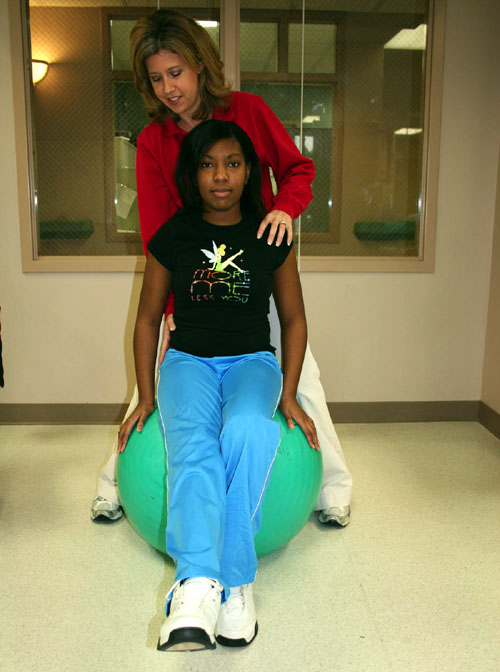

KEMPER COUNTY, Miss.—After a season of cheerleading for the Kemper County High School football team, Kristy Grace should have been in the best shape of her life.
But as the Christmas holidays neared, the 16-year-old noticed a strange weakness in her extremities. “My legs would flap when I walked, and I noticed my feet were numb,” she said. “Then the right side of my hand and fingers got numb and tight, and I couldn’t write.”
She began falling, too, and doctors seemed baffled by her symptoms. Then tests at Methodist Rehabilitation Center in Jackson verified a Meridian neurologist’s suspicions. Kristy had Guillain-Barre’ Syndrome, a rare neurological disorder that can cause full body paralysis.
Kristy’s case wasn’t that severe, and she’s already back to the hectic lifestyle of a high school junior. But the petite teen won’t soon forget the terror of being told she had a disorder that strikes only one to two people per 100,000.
‘I got scared and started crying because I thought I had something that would mess up my whole life,’’ she said. “They told me it could go to my lungs, and I would have a shortage of breath.”
Respiratory distress occurs when GBS paralyzes the muscles that move air in and out of the lungs. Kristy escaped that fate, but she still spent 11 days at Methodist Rehab fighting to overcome the disorder’s debilitating effects.
“She had a lot of difficulties with her ankles and her coordination and balance,” said physical therapist Heather Maloney.
“She also lost a good bit of strength in her hands,” said occupational therapist Suzanne Colbert. “But she was lucky. When she got to us, she was functioning at a relatively high level for someone with GBS.”
GBS occurs when the body’s immune system attacks myelin, the insulation that surrounds and protects nerve fibers, said Dr. Art Leis, a neurologist and senior scientist at Methodist Rehab’s Center for Neuroscience and Neurological Recovery. This leaves the nerves like frayed telephone wires and temporarily disconnects communication between the brain and muscles. The result is a creeping paralysis that usually begins in the extremities and edges upward.
According to the Centers for Disease Control (CDC), symptoms usually peak by four weeks and more than 95 percent of GBS victims survive. While most patients recover functionally, about 20 percent are left with persistent symptoms.
Dr. Leis said extensive physical and occupational therapy is critical for GBS patients. And as Mississippi’s only hospital that specializes in rehabilitation medicine, Methodist Rehab treats GBS sufferers from across the state – at least 28 since January, 2000.
While Audrey Grace initially wanted her daughter to undergo therapy closer to home, she said she’s glad she followed doctor’s advice and took advantage of Methodist Rehab’s expertise. The effects of GBS “was scary,” Grace said. But by the time Kristy left the hospital, she was well enough to show off her cheerleading skills in the therapy gym.
It’s not clear what set off Kristy’s GBS, but about half of cases are triggered by some type of viral or bacterial infection. “Typically it’s an upper respiratory infection, but it also can be gastrointestinal,” Dr. Leis said.
“Some cases of gastrointestinal infection have been linked to Campylobacter, a bacteria found in undercooked foods such as poultry.”
Other risk factors include a compromised immune system, stress, surgery and even vaccinations. While the CDC says less than 1 percent of GBS cases have been linked to vaccinations, a cluster of GBS was associated with the Swine Flu vaccine of 1976. And in 2005, the Food and Drug Administration alerted health care providers to five reports of the syndrome among teenagers receiving certain meningococcal vaccines.
Nevertheless, Leis advises against using the threat of GBS as an excuse to skip necessary vaccinations. “The risk of developing GBS is minimal compared to the risk of developing the diseases that the vaccines prevent.”
He adds, however, that it is important to be aware of the connection and seek help if you have weakness, numbness, tingling or increased sensitivity following a vaccination. Since Guillain-Barre’ can progress fairly rapidly to paralysis, support services can be critical.
Kristy said she felt therapy had made her stronger than ever. But as she got ready to leave Methodist Rehab, more exercise was not on her immediate agenda. When asked what she was looking forward to at home, she said: “I want to lay in my own bed.”
For More Information:
